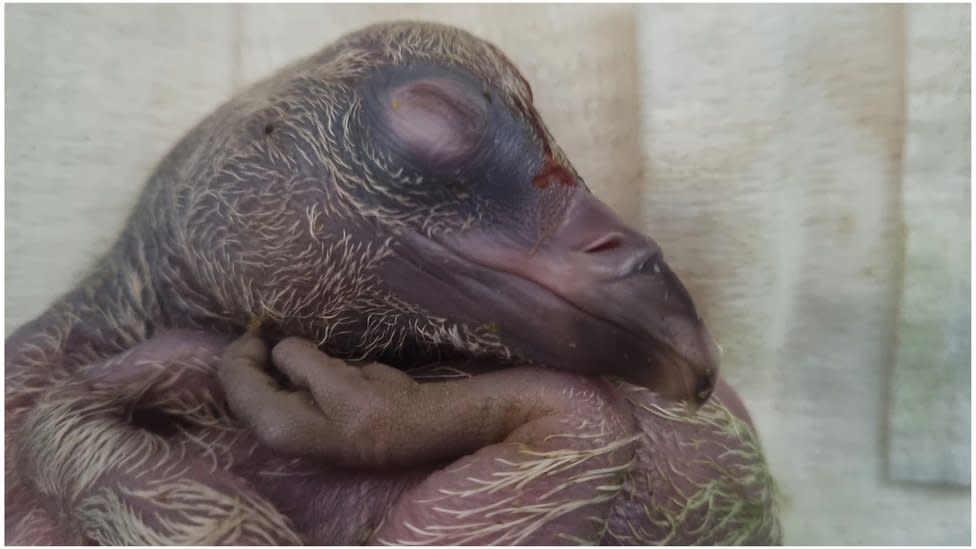London Zoo: Vulture Rupert is 'key step forward' for species

A critically endangered vulture chick has been returned to its parents after being hand-reared by zookeepers.
The technique will be shared with conservation zoos worldwide, in the hope it will help bolster the population of Rüppell's griffons.
It is the first time an incubated hatchling at London Zoo has been returned to its family.
The zoo said it was a "milestone for vulture rearing" and marked a "key step forward" for the species.
Named Rupert, the chick will continue its growing up under the tutelage of mother Phil and father Cuthbert.
Vulture experts looked after the chick, whose sex is not yet known, to maximise its chance of survival and at the same time made sure the hatchling bonded with its parents.
Phil and Cuthbert were given a dummy egg to tend to while the keepers monitored Rupert for five days post-hatch.
Rüppell's griffon vultures
Rüppell's griffon vultures are the world's highest-flying birds, documented to have reached soaring heights of 10,973m above sea level - the same height as most aeroplanes.
They play a critical role in protecting ecosystems, helping to keep the African countryside free of harmful diseases by feeding on abandoned animal carcasses.
They are found within the region of Africa known as the Sahel Region, between the Sahara in the north and the Sudanian Savanna to the south.
The vulture's range of flight crosses through a number of countries and regions including southwestern Mauritania, southern Arabia, Zimbabwe and South Africa.
They have also shown up in Spain, possibly due to the bird's natural habitat becoming increasingly threatened.
Their "at risk" classification shifted from "of least concern" in 2004 to "critically endangered" in 2015.
Source: London Zoo
The egg was kept at 36.6C (97.9F) for an incubation period of 55 days, with the team turning it three times a day to mimic the natural behaviour of vultures with an egg in the nest.
The egg was weighed every day, and the temperature and humidity of the incubator adjusted accordingly to allow for a successful hatch.
Rupert was placed inside bits of its eggshell and left for its parents to find it on their return to their nest.
Phil and Cuthbert had responded well to the chick, the zoo said.
Jessica Fryer, London Zoo keeper and bird specialist, said: "This milestone for vulture rearing at London Zoo marks a key step forward to boost population numbers.
"Rupert marks an important development for the European Breeding Programme for the Critically Endangered species, which forms a collaborative international network of conservation zoos to support the development of a healthy, genetically-diverse population."
She added: "The lessons from this brilliant conservation success will benefit the global community of conservation zoos and help to continue the vital work needed to protect this species."
When Rupert has fledged the nest (at approximately 3.5 months old) the zoo can send a feather off for DNA testing to discover if it is male or female.
Listen to the best of BBC Radio London on Sounds and follow BBC London on Facebook, X and Instagram. Send your story ideas to hello.bbclondon@bbc.co.uk

